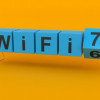Gone in 120 seconds: Cracking Wi-Fi security
WEP is dead - and here's the proof.
Cracking the Wi-Fi security protocol WEP is a probability game. The number of packets required to successfully decrypt the key depends on various factors, luck included. When WEP was compromised in 2001, the attack needed more than five million packets to succeed. During the summer of 2004, a hacker named KoreK published a new WEP attack (called chopper) that reduced by an order of magnitude the number of packets requested, letting people crack keys with hundreds of thousands of packets, instead of millions.
Last month, three researchers, Erik Tews, Andrei Pychkine and Ralf-Philipp Weinmann developed a faster attack (based on a cryptanalysis of RC4 by Andreas Klein), that works with ARP packets and just needs 85,000 packets to crack the key with a 95 per cent probablity. This means getting the key in less than two minutes.









































































